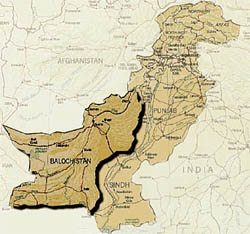Jan 07, 2026
Jan 07, 2026
 Baluchistan is Pakistan's largest province and the richest in oil, natural gas and mineral deposits. It comprises nearly half the size of Pakistan and bordering the Arabian Sea provides virtually the entire coastline of Pakistan. Its contiguity with Iran and Afghanistan enhances its geo-strategic importance not only to Pakistan but also to the United States in execution of its regional strategies in Afghanistan and against Iran. It figures significantly in US Central Command strategic operational planning.
Baluchistan is Pakistan's largest province and the richest in oil, natural gas and mineral deposits. It comprises nearly half the size of Pakistan and bordering the Arabian Sea provides virtually the entire coastline of Pakistan. Its contiguity with Iran and Afghanistan enhances its geo-strategic importance not only to Pakistan but also to the United States in execution of its regional strategies in Afghanistan and against Iran. It figures significantly in US Central Command strategic operational planning.
Baluchistan, significantly, is the region in which Pakistan carried out its nuclear weapons tests and there are good reasons to believe that a major portion of Pakistan's nuclear weapons are located here.
Baluchistan has been in the news ever since 1947 when Pakistan came into existence as a theocratic state, ostensibly as a homeland for Indian Muslims. Baluchistan refused to join Pakistan and demanded independence and self-determination and held out till1948 when Pakistan Army with tanks launched military operations to militarily annex it. Rather strange, when Pakistan at the same time was claiming self- determination for Kashmir. But not so surprising as under this garb it launched its military operations in Kashmir but only to be thwarted by India to which this princely state had legally acceded to.
Baluchistan never gave up its struggle for independence and has been subjected to genocidal military operations by the Pakistan Army at least four times until now. It never made the world headlines because Pakistan traded the region's strategic importance to American military strategies and bought United States silence on its brutal suppression in Baluchistan.
Baluchistan is now once again being subjected to genocidal military operations by the Pakistan Army for the fifth time or so. The Pakistan Army has been engaged in military operations in Baluchistan for the last two years but these have intensified in December 2005 as a sequel to Baluchi freedom fighters rocket attacks on General Musharraf's meeting in the Kohlu area which he was visiting. He had gone there to lay the foundation stone of new Pakistan Army Cantonments in Baluchistan. The Baluchis are against development of new cantonments in their region and also the diversion of their oil and gas revenues from provincial development to military projects. It is also a sequel to a recent rocket attack on the helicopter ferrying a Pakistani General in the region. In fact there is a virtual rebellion in Baluchistan against Pakistan.
Pakistan Army's military operations against Baluchi tribal strongholds now incorporate use of jet fighter aircraft, napalm bombing and helicopter gun-ships in terms of Air Force operations. In terms of Army operations nearly 36,000 troops supported by artillery and tanks are in operation against the ill-equipped Baluchi tribesmen. Militarily, counter-insurgency operations do not involve use of disproportionate and indiscriminate firepower. It has raised a storm of protests in Pakistan irrespective of provincial considerations and condemnation by Pakistan Human Rights Commission, retired Generals and diplomats.
Ironically, Pakistan Army's genocidal military operations in Baluchistan are taking place in the month of December which should hold special significant lessons for Pakistan as follows:
Ironically, and more tragic is the deafening silence of the United States and particularly the United States Congress on the genocidal military operations of the Pakistan Army in Baluchistan for the following reasons:
The silence of the United States and the United States Congress can be attributed to the commitments by General Musharraf and the Pakistan Army to permit the United States to use Baluchistan territory as a springboard for launching any future military intervention against Iran and presently for operations by Iranian dissident para-military organizations.
The United States future strategic requirements would be better served by American facilitation of the emergence of an INDEPENDENT BALUCHISTAN as a strategic wedge between Pakistan, Iran and Afghanistan. It would also lead to future obviation of Pakistani blackmail of using its proximity to The Gulf and Hormuz Strait as a bargaining chip against the United States, since this arises from Baluchistan being in Pakistani possession.
01-Jan-2006
More by : Dr. Subhash Kapila